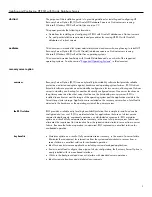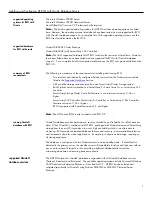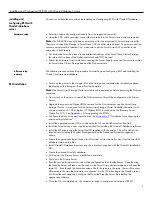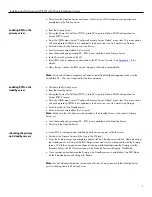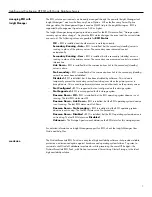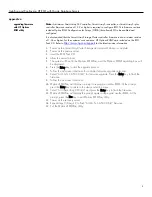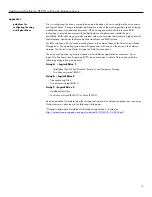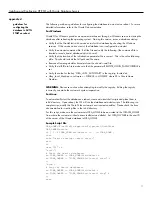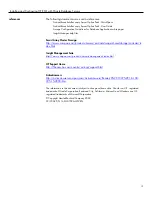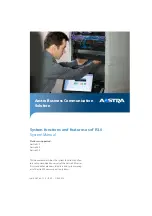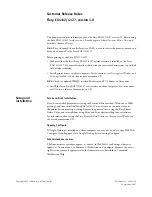
Installing and Configuring HP RSO with Oracle Database Servers
3
supported operating
systems for RSO with
Oracle
Microsoft Windows 2000® Server
Microsoft Windows 2000® Advanced Server
Linux® (Red Hat
version 7.2, Professional or Enterprise
)
Note:
The list of supported operating systems for HP RSO includes operating systems not listed
here. However, the operating systems listed above have been tested, and are supported for RSO
with Oracle9
i
database support. For a complete list of ALL supported operating systems, see the
RSO User Guide located on the RSO CD.
supported hardware
for RSO with oracle
ProLiant
DL380G2 Cluster Package
ProLiant
DL360G2 (with
Smart Array
532 Controller)
Note:
The list of supported hardware for HP RSO includes other servers not listed here. However,
the servers listed above have been tested and are supported for RSO with Oracle9
i
database
support. For a complete list of ALL supported hardware, see the RSO user guide available on the
RSO CD.
summary of RSO
requirements
The following is a summary of the requirements for installing and running RSO:
−
Two identical and identically configured
ProLiant
servers from the
ProLiant
server models
listed in the
Supported Hardware
Section.
−
All hard drive storage resides externally in one
Smart Array
Cluster Storage system.
−
Each
ProLiant
server is attached to a
Smart Array
5i,
Smart Array
5i+ or
Smart Array
532
controller.
−
Smart Array
Storage Cluster Controller firmware is at a minimum revision of 1.34 or
higher.
−
Smart Array
532 Controller,
Smart Array
5i Controller, or
Smart Array
5i Plus Controller
firmware revision of 1.92 or higher.
−
RSO is supported with
SmartStart
version 5.5 and higher.
Note:
The HP Options ROM is also included on the RSO CD.
running Oracle9
i
database with RSO
Oracle9
i
database provides performance, security, scalability, and reliability for critical business
data. When Oracle9
i
is combined with HP RSO, packaged with
ProLiant
servers and
Smart Array
storage from the new HP, it provides a low cost, high availability solution -- an alternative to
clustering. RSO provides automated database failover and recovery to ensure reliable protection
and increased uptime for critical applications. It’s simple to configure and manage, requiring no
clustering experience.
The database is configured with two
ProLiant
servers in active-standby mode. If a fatal fault is
detected in the primary server, the standby server will immediately initialize and take over without
any need for manual intervention, thus providing a lights-out database failover solution,
minimizing downtime and ensuring business continuity.
supported Oracle9
i
database versions
The HP RSO solution for Oracle9
i
database is supported with all Oracle9
i
database versions
(Personal, Standard, and Enterprise). The available operating systems include Microsoft Windows
2000 Standard or Enterprise Editions, or Linux Red Hat 7.2. HP RSO has been tested and
validated specifically for Oracle9
i
using
ProLiant
DL380G2 or DL360G2 Clustered Server
Package.


